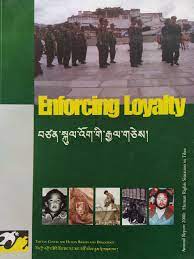According to reliable information received from Tibet, Lobsang Dhargyal suddenly died Monday morning on 19 November 2002 in a Manufacturing Unit for Hydro-Electricity Power Plant, a “reform through labour” camp located in Siling Village, Machen County (Ch:Maqin xian), Golog “Tibet Autonomous Prefecture”, Qinghai Province. He was serving almost 19 years’ prison term including his earlier two and a half years’ imprisonment.
Although TCHRD is yet to receive detail information, it is almost certain that Lobsang Dhargyal’s sudden demise is due to torture and maltreatment in the forced labour camp. He is believed to have suffered brain haemorrhage at the time of death. More updates on his death shall follow upon receiving further information.

